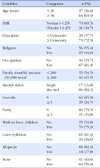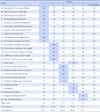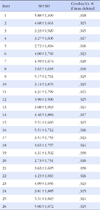Abstract
Purpose
Polycystic Ovary Syndrome Questionnaire (PCOSQ) was developed to measure health-related quality of life of women who had polycystic ovary syndrome. The purpose of this study was to exam reliability and validity of the Korean version of PCOSQ.
Methods
sample of 101 women who had polycystic ovarian syndrome was recruited from outpatient gynecology clinics. Factor analysis was carried out to verify the composition of dimensions of the Korean version of PCOSQ. Concurrent validity was examined by assessing the correlation between the PCOSQ and health related quality of life, and convergent validity was evaluated by testing correlation between PCOSQ and depression. Reliability was assessed using Cronbach's α.
Results
The content validity was satisfactory (CVI=0.85). Factor analysis identified 5 factors, and factor loadings of the PCOSQ ranged from .48 to .90. Correlation was found between the PCOSQ and health related quality of life (Physical component score: r=.33, p=.001; Mental component score: r=.44, p<.001) and between the PCOSQ and depression (r=-.36, p<.001). The Cronbach's α of the PCOSQ was .93, indicating reliable reliability.
Figures and Tables
Summary Statement
▪ What is already known about this topic?
Women with polycystic ovary syndrome (PCOS) have a lower quality of life than do healthy women. A measure of the quality of life of women with PCOS was developed. Its reliability and validity have been verified in many studies.
▪ What this paper adds?
It was confirmed that the Korean version of the PCOS questionnaire has high reliability and good content, construct, concurrent, and convergent validity.
▪ Implications for practice, education and/or policy
A validated Korean version of the PCOS questionnaire may help nurses identify the specific needs of patients with PCOS and develop appropriate nursing interventions for Korean women with PCOS.
References
1. March WA, Moore VM, Willson KJ, Phillips DI, Norman RJ, Davies MJ. The prevalence of polycystic ovary syndrome in a community sample assessed under contrasting diagnostic criteria. Hum Reprod. 2010; 25(2):544–551.

2. Teede H, Deeks A, Moran L. Polycystic ovary syndrome: A complex condition with psychological, reproductive and metabolic manifestations that impacts on health across the lifespan. BMC Med. 2010; 8:41.

3. Kim JD, Kang YK. 2012 Statistics of health insurance [Internet]. Seoul: National Health Insurance Corporation;2012. cite 2014 October 15. Available from: http://www.nhis.or.kr.
4. Pourteymour Fard Tabrizi F, Alipoor B, Mehrzad Sadaghiani M, Ostadrahimi A, Malek Mahdavi A. Metabolic syndrome and its characteristics among reproductive-aged women with polycystic ovary syndrome: A cross-sectional study in northwest Iran. Int J Fertil Steril. 2013; 6(4):244–249.
5. Haoula Z, Salman M, Atiomo W. Evaluating the association between endometrial cancer and polycystic ovary syndrome. Hum Reprod. 2012; 27(5):1327–1331.

6. Gambineri A, Patton L, Altieri P, Pagotto U, Pizzi C, Manzoli L, et al. Polycystic ovary syndrome is a risk factor for type 2 diabetes: Results from a long-term prospective study. Diabetes. 2012; 61(9):2369–2374.

7. Homburg R. Pregnancy complications in PCOS. Best Pract Res Clin Endocrinol Metab. 2006; 20(2):281–292.

8. Bjercke S, Dale PO, Tanbo T, Storeng R, Ertzeid G, Abyholm T. Impact of insulin resistance on pregnancy complications and outcome in women with polycystic ovary syndrome. Gynecol Obstet Invest. 2002; 54(2):94–98.

9. Li Y, Li Y, Yu Ng EH, Stener-Victorin E, Hou L, Wu T, et al. Polycystic ovary syndrome is associated with negatively variable impacts on domains of health-related quality of life: Evidence from a meta-analysis. Fertil Steril. 2011; 96(2):452–458.

10. Coffey S, Bano G, Mason HD. Health-related quality of life in women with polycystic ovary syndrome: A comparison with the general population using the Polycystic Ovary Syndrome Questionnaire (PCOSQ) and the Short Form-36(SF-36). Gynecol Endocrinol. 2006; 22(2):80–86.
11. Deeks AA, Gibson-Helm ME, Teede HJ. Anxiety and depression in polycystic ovary syndrome: A comprehensive investigation. Fertil Steril. 2010; 93(7):2421–2423.

12. Ware JE, Sherbourne CD. The MOS 36-item short-form health survey(SF-36): I. conceptual framework and item selection. Med Care. 1992; 30(6):473–483.
13. Boivin J, Takefman J, Braverman A. The fertility quality of life (FertiQoL) tool: Development and general psychometric properties. Fertil Steril. 2011; 96(2):409–415.

14. McGirr M, Rukholm E, Salmoni A, O'sullivan P, Koren I. Perceived mood and exercise behaviors of cardiac rehabilitation program referrals. Can J Cardiovasc Nurs. 1990; 1(4):14–19.
15. Wang XS, Willians LA, Eng C, Mendoza TR, Shah NA, Kirkendoll KJ, et al. Validation and application of a module of the M. D. Anderson Symptom Inventory for measuring multiple symptoms in patients with gastrointestinal cancer (the MDASI_GI). Cancer. 2010; 116(8):2053–2063.

16. Williams LS, Weinberger M, Harris LE, Clark DO, Biller J. Development of a stroke-specific quality of life scale. Stroke. 1999; 30(7):1362–1369.

17. WHOQOL Group. The World Health Organization Quality of Life assessment (WHOQOL): Position paper from the World Health Organization. Soc Sci Med. 1995; 41(10):1403–1409.
18. Cronin L, Guyatt G, Griffith L, Wong E, Azziz R, Futterweit W, et al. Development of a health-related quality-of-life questionnaire (PCOSQ) for women with polycystic ovary syndrome (PCOS). J Clin Endocrinol Metab. 1998; 83(6):1976–1987.

19. Guyatt G, Weaver B, Cronin L, Dooley JA, Azziz R. Health-related quality of life in women with polycystic ovary syndrome, a self-administered questionnaire, was validated. J Clin Epidemiol. 2004; 57(12):1279–1287.

20. Jones GL, Benes K, Clark TL, Denham R, Holder MG, Haynes TJ, et al. The Polycystic Ovary Syndrome Health-Related Quality of Life Questionnaire (PCOSQ): A validation. Hum Reprod. 2004; 19(2):371–377.

21. Arrindel WA, van der Ende J. An empirical test of the utility of the observations-to-variables ratio in factor and components analysis. Appl Psychol Meas. 1985; 9(2):165–178.
22. Beck AT, Ward CH, Mendelson M, Mock J, Erbaugh J. Beck Depression Inventory (BDI). Arch Gen Psychiatry. 1961; 4(6):561–571.
23. Stevens J. Applied multivariate statistics for the social sciences. 5th ed. New York, NY: Routledge;1996.
24. Jones GL, Hall JM, Balen AH, Ledger WL. Health-related quality of life measurement in women with polycystic ovary syndrome: A systematic review. Hum Reprod Update. 2008; 14(1):15–25.

25. Chang SN, Mu PF. Infertile couples' experience of family stress while women are hospitalized for ovarian hyperstimulation syndrome during infertility treatment. J Clin Nurs. 2008; 17(4):531–538.

26. Kang H. A guide on the use of factor analysis in the assessment of construct validity. J Korean Acad Nurs. 2013; 43(5):587–594.

27. Bazarganipour F, Ziaei S, Montazeri A, Foroozanfard F, Faghihzadeh S. Iranian version of modified polycystic ovarian sycdrome health-related quality of life questionnaire: Discriminant and convergent validity. Iran J Reprod Med. 2013; 11(9):753–760.




 PDF
PDF ePub
ePub Citation
Citation Print
Print








 XML Download
XML Download